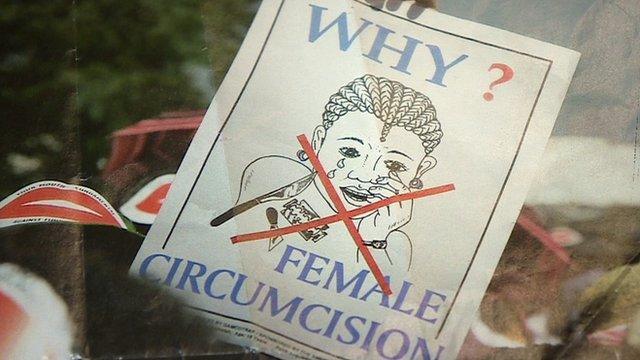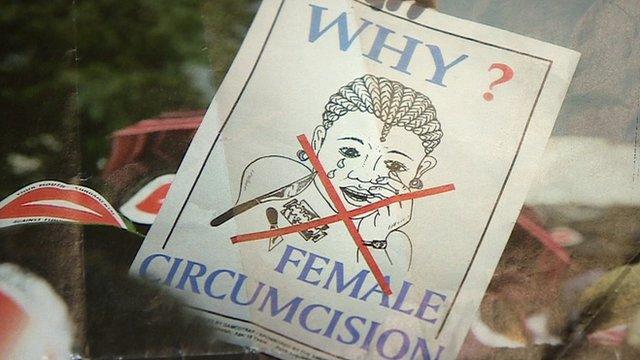FGM operation planned for UK airports
- Published
- comments

Female genital mutilation is estimated to have affected 66,000 women in Britain
Police are launching an operation to prevent girls being flown abroad to be subjected to Female Genital Mutilation.
The nationwide summer initiative will involve eight police forces focusing on five airports.
The attempt to stop girls being taken abroad is the largest such operation to be launched in the UK.
Commander Mak Chishty of the Association of Chief Police Officers, told MPs he supported mandatory examinations of girls for signs of FGM.
There are an estimated 66,000 victims of FGM in the UK and the police and Crown Prosecution Service have been under pressure to bring more cases to court.
Speaking to the Home Affairs Committee, Commander Chishty, the national policing lead for FGM, said that there had been two airport-based operations in 2013 which had attempted to identify girls being flown abroad to be subjected to the abuse.
He said that the exact details of the larger 2014 plan would remain confidential, but it would be timed to achieve "maximum operational effect" for potential victims who are at the "height of vulnerability".
Commander Chishty said police had received 206 referrals of possible FGM and had referred 11 cases on to the CPS. The first prosecution for alleged FGM began earlier this year and a further four cases are awaiting charging decisions. In contrast, there have been 100 FGM-related convictions in France.
"Despite a number of efforts we simply haven't got the the intelligence or the referrals made to us to refer cases on to the CPS," Commander Chishty told MPs.
"I think there is reluctance of communities to report this to us. The amount of referrals from health education and social care have not been as large as we would like to see. Where there are signs of FGM having taken place or there is risk, we would like those reports to come through to us."
In 2013, a a joint report by the Royal Colleges of Midwives, Nursing and Obstetricians and Gynaecologists said health professionals should identify girls at risk of FGM as early as possible, treat it as child abuse and refer cases to the police.
Commander Chishty said that he supported the creation of special court orders to protect potential victims which would operate in a similar way to Forced Marriage Protection Orders. He said such orders could be used to ban families from taking girls abroad or even require a mandatory medical examination to establish if someone has been a victim.
France operates a scheme of mandatory examination of school girls, an idea that is backed by some British campaigners.
"I would support mandatory testing for high risk cases," said Commander Chishty. "I would like to have a discussion around it."
- Published4 November 2013
